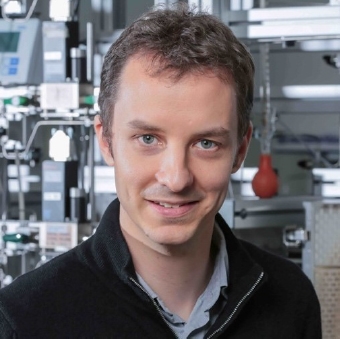
Date:
Location:
Speaker:
ABSTRACT:
After atmospheric CO2, lignocellulosicbiomass is the second-largest source of renewable carbon on our planet. This makes biomass a very attractive source of sustainable alternatives to fossil-derived chemicals. The production of various chemicals from biomass usually involves the depolymerizationof biomass’s three constituent polymers: cellulose and hemicellulose, which are both polysaccharides; and lignin, which is a polymer of phenyl propanoidsub-units. These three types of complex molecules are broken down into their constituent monomers, which include sugars and phenyl propane derivatives. In turn, these low-molecular weight monomers can be catalytically upgraded to either direct or indirect substitutes for petrochemicals. In both depolymerizationand catalytic upgrading, the biggest challenge is usually not achieving the desired reaction, but rather avoiding being outcompeted by other, detrimental reactions.
Depolymerization reactions of the major biomass constituents –polysaccharides and lignin –are often outpaced by subsequent degradation reactions of sugars and lignin intermediates. In addition, the many oxygenated functionalities on renewable intermediates like lignin monomers can lead to parallel reaction and low selectivity during their upgrading over heterogeneous catalysts.
In this talk, I will present several solutions to these challenges that my laboratory has developed. I will show how we can use protection group chemistry, both during lignin extraction and polysaccharide depolymerization, to reversibly “trap” stabilized intermediate molecules, and facilitate their high-yield upgrading1,2. Notably, we can show that, under the right conditions, extracted lignin can be catalytically upgraded at high yields to as few as 1-2 major products3. I will also discuss how targeted surface modifications on heterogeneous catalysts can lead to dramatic changes in selectivity during subsequent lignin monomers deoxygenation4,5.
BIO:
Jeremy Luterbacherwas born in Switzerland in 1984 and received a B.Scand M.Sc. in chemical engineering from the ÉcolePolytechniqueFédéralein Lausanne (EPFL), Switzerland in 2007. He spent a year as a visiting scientist at the Massachusetts Institute of Technology (MIT) working in Jeff Tester’s lab. Jeremy then moved to Cornell University in Ithaca, New York, to pursue doctoral studies in Prof. Larry Walker’s lab. After receiving his PhD in 2012, Jeremy joined the Great Lakes Bioenergy Research Center at the University of Wisconsin-Madison as a Swiss National Science Foundation Postdoctoral Scholar under the supervision of Prof. Jim Dumesic. In 2014, Jeremy returned to EPFL as a Tenure-Track Assistant Professor and head of the Laboratory of Sustainable and Catalytic Processing.
Since arriving at EPFL, Jeremy has been awarded the Assistant Professor Energy grant from the Swiss National Science Foundation in 2014 and a European Research Council (ERC) starting grant in 2017. He was awarded the 2019 Werner Prize by the Swiss Chemical Society for outstanding independent chemical research in Switzerland.



